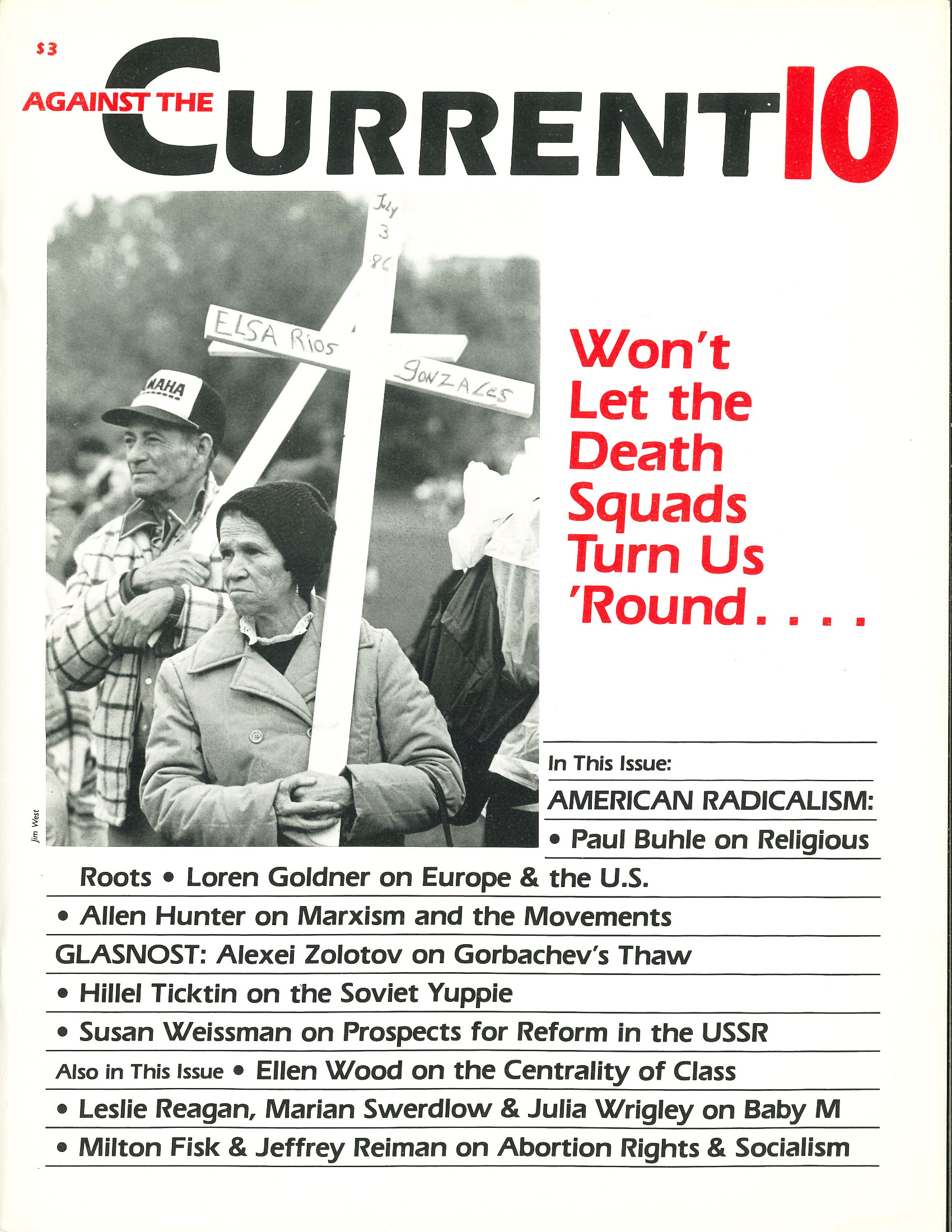Against the Current, No. 10, September/October 1987
-
Letter from the Editors
— The Editors -
Editorial: Korea Workers Take the Lead
— The Editors -
Death Squad Activity in Los Angeles
— Susan Wyler -
A Strategy for Irish Solidarity
— Bob Nowlan -
Why Class Struggle Is Central
— Ellen Meiksins Wood -
Random Shots: More Mines for Ronnie
— R.F. Kampfer - American Radicalism
-
Reflections on American Radicalism, Past & Future
— Paul Buhle -
Afro-Anabaptist-Indian Fusion
— Loren Goldner -
A Response to Paul Buhle: Limits of Religious Rebellion
— Allen Hunter - Abortion Rights & Socialism
-
A Group Liberationist Approach
— Milton Fisk -
Why Socialists Should Support Individual Natural Rights
— Jeffrey Reiman -
A Rejoinder: The Fallacies of Liberal Rights
— Milton Fisk - Looking at Glasnost
-
Gorbachev's Glasnost: Thaw II
— Aleksei K. Zolotov -
The Soviet Yuppie Takes Power
— Hillel Ticktin -
Who Benefits from Reforms?
— Susan Weissman -
Response to Reform & Bureaucratic Power
— Justin Schwartz -
Reply to Question on Reform & Bureaucratic Power
— Michael Löwy -
Whose Baby Is It Anyway?
— Julia Wrigley -
Surrogacy Is a Bad Bargain
— Leslie J. Reagan - Review
-
Wuthering Heights Revisited
— Michael Sprinker
Justin Schwartz
ENCLOSED IS A check for a two-year subscription to Against the Current.
While I strongly agree with Michael Löwy about the need for utopian vision and workers’ self-activity as a condition for genuine emancipation (“Marxism and the Utopian Vision,” ATC #8, March-April 1987), I want to take friendly exception to his claim that “the Polish events demonstrated that reform of the bureaucratic state is an impossibility.”
Such a bald assertion is unfortunate at this particular juncture, with apparently genuinely reforming governments in both the USSR and China. We need serious reflection on the meaning of Gorbachev’s and Deng’s reforms.
First, it is just bad logic to argue from a single case such as Polish martial law (or even several, adding the invasions of Hungary and Czechoslovakia and the repression of East German workers) to a very general conclusion about the impossibility of reforming “actually existing socialism.”
Adducing a few positive instances of one’s theory at best tends to confirm its claims. It does not demonstrate them. One must also test it against negative instances and explain apparent counterexamples.
But second, this would be academic if we did not have on hand striking counterexamples in the recent accession to power of Mikhail Gorbachev and Deng Xiaoping. It is too early to say that their programs will bring about fundamental, emancipatory change in their nations, or even to be entirely sure of what their programs are. But nonetheless there can be no doubt that these programs represent enormous attempts to do what Löwy says is impossible and are backed by powerful social and economic forces in both countries.
I can’t comment with any confidence on China, but I am moderately familiar with the Soviet situation (I teach Soviet politics at the University of Michigan and have published on Soviet military policy). Gorbachev appears to me to be completely sincere in his desire to bring what he calls “revolutionary” change and “radical reform” to the Soviet system. Dmitri K. Symes, a highly critical observer, calls him “a great romantic Leninist” who hates the filth of Stalinism. Seweryn Bialer, a deeply anticommunist exiled Polish Sovietologist who only last year claimed that the Soviet elite could block the emergence of any radical reformer, has been forced to eat his words and now admits Gorbachev is the real thing.
Whether Gorbachev will succeed is another matter. But radical reform cannot be his personal whim. He would not be general secretary if he did not have the support of strong reforming currents in the CPSU and in Soviet society generally. Gorbachev has not confined himself to fine phrases in favor of democracy and glasnost. He has instituted reforms on a wider scale and in a shorter time than I would have thought possible. Not only has he released about ten percent of the remaining 2,000 political prisoners in the USSR and publically humiliated and fired a KGB chief who tried to frame a muckraking journalist, he has rammed through the principle of competitive elections to party and government posts, which he advocated at the Twenty-seventh Party Congress last March. This is now being tried on a limited basis in some areas.
More in the spirit of Löwy’s ideas about emancipation, Gorbachev is an advocate of workers’ control. At the huge Kornmutator complex in Riga, for example, managers have to stand for reelection by the workers every two years. This is a preGorbachev reform, but Gorbachev has been extending such programs in many areas in a neglected counterpart to his (so far) modest but significant NEP-style market reforms.
Of course even if Gorbachev succeeds in making such radical reforms, won’t this be a “revolution from above” and not a product of worker’s self-activity? And won’t that limit the possibilities for emancipation? These are some of the questions we have to study carefully-and which are foreclosed by Löwy’s insistence that the whole project of reform is impossible. Here I will only say that what starts as a “revolution from above” may not end up that way.
September-October 1987, ATC 10

